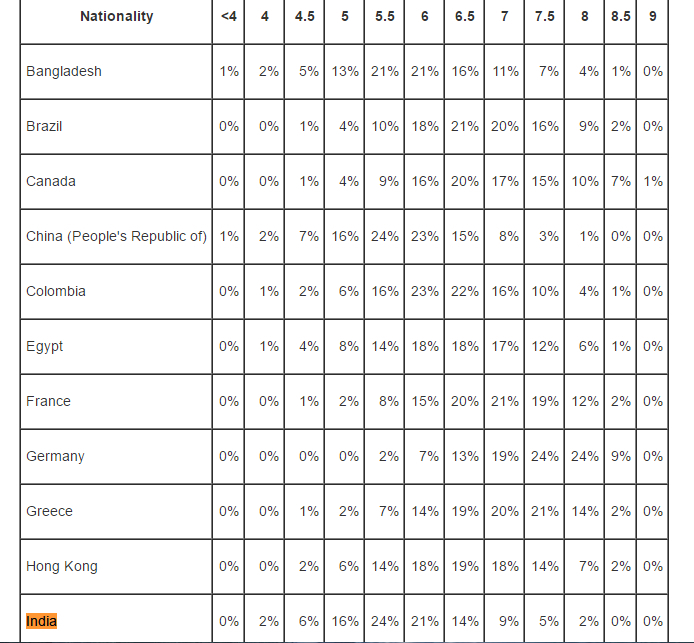3 reasons why most Indians score band 6 in IELTS

Recently, the IELTS official website released a demographic data report for the year 2015. This data gives a percentage wise drilldown of the band scores earned by Indian students in the International English Test. See image above.
So, is IELTS easy in India?
45% of the Indians who took the exam last year have scored in the middle band of 5.5 and 6, a score which by IELTS standards is considered average. The only other country with a higher percentage of candidates than India in the same band, is China. Considering the fact that Indians and Chinese form a large proportion of foreign students in USA, UK and Canada, these percentages translate to many thousands in real numbers, for the year 2015. Over the years, many foreign education consultancy firms have cropped up in India, with promises of high IELTS/TOEFL scores and admissions to foreign institutes. British Council and ETS (Educational Testing Service) have also released video courses on MOOC (Maasive Open Online Courses) and YouTube, giving competition to other Indian tutorials on similar channels. Despite easy assistance and learning avenues, why are so many Indian test takers scoring average bands in the exam?

- Indian pronunciation and slang: While many IELTS coaching institutes have agreed that the Indian accent does not impact marking of the speaking section in IELTS, pronunciation of words is an important marking parameter. For e.g. the word cucumber being pronounced as ‘coo-coom-ber’ or dengue pronounced as ‘deng-yoo’ or asthma pronounced as ‘us-th-maa’. S. Advitya, an IELTS aspirant from Mumbai, says, “During speaking training in IELTS coaching, one of one sessions are held to emphasise on the student’s pronunciations. For students from non-English speaking backgrounds like me, speaking training should ideally start 6 months before the exam.” Furthermore, India, despite being a non-native English speaking country, uses the English language for all its official purposes. However, this allows room to develop many slang phrases and words (See image above) in due course of conversations. For e.g. Some coaching institutes argue that learning a new language from scratch eliminates the use of slang as opposed to for those who have been speaking the language for years and have developed slang expressions through regular conversations.
- Taking the exam for granted: IELTS is perceived as an easy exam for most takers with English speaking backgrounds. Students usually start preparing for the exam 1-2 weeks in advance. The focus of practice is usually on the writing and speaking sections, where essay type questions are asked. In this bargain, less emphasis is put on revising basic grammar rules. Sadia Siddiqui, an aspirant from Mumbai, says, “In the readings section, the questions asked tend to be misunderstood because they use synonyms or antonyms of the passage words rather than using the exact phrase from the passage. I have known friends who have got confused between use of double negatives and rhetoric sentences.” The rule is to not take either sections of the test for granted. We usually write the way we speak, and even those with fluent English could unknowingly make basic errors while speaking. Furthermore, the voice over in the listening section has British, American and Australian accents. Indians not accustomed to listening to foreign accents may misinterpret words. For e.g. the word hostile is pronounced differently in India than in the US. With the American accents, the same word may be misunderstood as ‘hostel’.
- Learning English is a process: A few months ago, when this correspondent was visiting Chandigarh, she came across billboards in the city promising to teach English in 30 days for IELTS/TOEFL. Even in Mumbai, station walls have bills claiming to training you to speak English like an American. As much as some may find these tall claims ridiculous, there is a section of people who fall for such misleading advertisements. There is no shortcut to learning a language. According to KIC Education (International English Test coaching institute), Mumbai, “Learning English is a process. Students cannot rote learn a few rules and use tricks to score in the IELTS. It takes daily practice to frame sentences without grammatical errors, let alone picking up a foreign accent.” For many, IELTS training begins a week or two before the exam day, but for those who want to overcome the accent and pronunciation challenges in the speaking and listening sections, must start preparing as early as 3 months before the exam.
FAQs
Q. Is IELTS easy in India?
Ans. Undoubtedly, the requirements are the same in every country, and the exam was similarly created with the same hierarchy. But many Indians found the IELTS test challenging in various ways. The accent doesn’t affect the marking parameter. Some candidates claim IELTS is easy in India and some find it difficult.
Q. What is IELTS full form?
Ans. IELTS full form is The International English Language Testing System.
Q. What is the eligibility for IELTS India Exam?
Ans. Only candidates at least 16 years old are eligible to take the IELTS exam in India and worldwide. Anyone 16 years old or older, regardless of gender, nationality, or background, is eligible to take the IELTS India exam.
